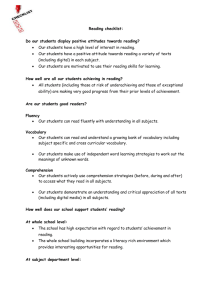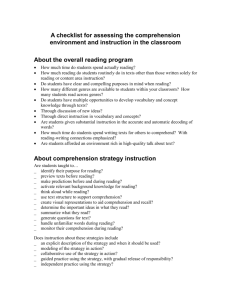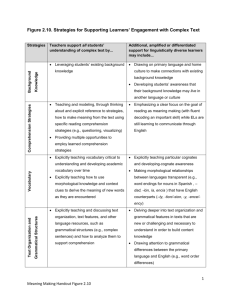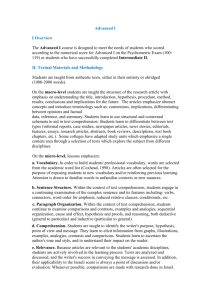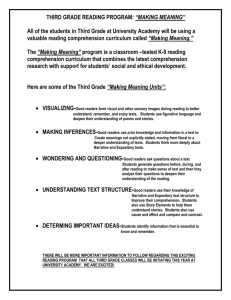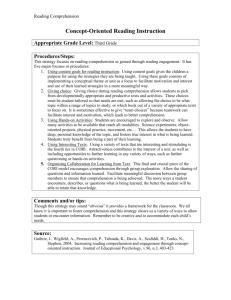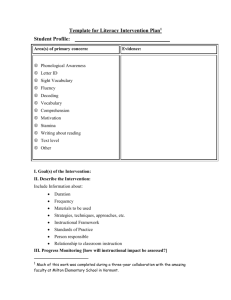FR101: French Language I FR231: French Language II
advertisement
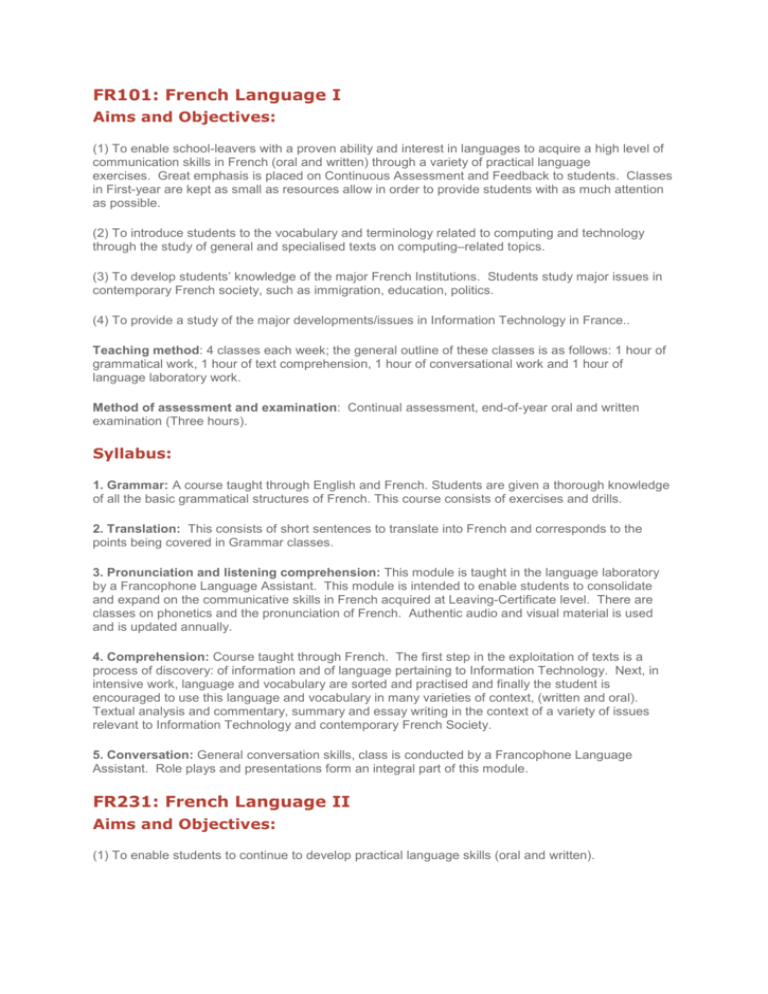
FR101: French Language I Aims and Objectives: (1) To enable school-leavers with a proven ability and interest in languages to acquire a high level of communication skills in French (oral and written) through a variety of practical language exercises. Great emphasis is placed on Continuous Assessment and Feedback to students. Classes in First-year are kept as small as resources allow in order to provide students with as much attention as possible. (2) To introduce students to the vocabulary and terminology related to computing and technology through the study of general and specialised texts on computing–related topics. (3) To develop students’ knowledge of the major French Institutions. Students study major issues in contemporary French society, such as immigration, education, politics. (4) To provide a study of the major developments/issues in Information Technology in France.. Teaching method: 4 classes each week; the general outline of these classes is as follows: 1 hour of grammatical work, 1 hour of text comprehension, 1 hour of conversational work and 1 hour of language laboratory work. Method of assessment and examination: Continual assessment, end-of-year oral and written examination (Three hours). Syllabus: 1. Grammar: A course taught through English and French. Students are given a thorough knowledge of all the basic grammatical structures of French. This course consists of exercises and drills. 2. Translation: This consists of short sentences to translate into French and corresponds to the points being covered in Grammar classes. 3. Pronunciation and listening comprehension: This module is taught in the language laboratory by a Francophone Language Assistant. This module is intended to enable students to consolidate and expand on the communicative skills in French acquired at Leaving-Certificate level. There are classes on phonetics and the pronunciation of French. Authentic audio and visual material is used and is updated annually. 4. Comprehension: Course taught through French. The first step in the exploitation of texts is a process of discovery: of information and of language pertaining to Information Technology. Next, in intensive work, language and vocabulary are sorted and practised and finally the student is encouraged to use this language and vocabulary in many varieties of context, (written and oral). Textual analysis and commentary, summary and essay writing in the context of a variety of issues relevant to Information Technology and contemporary French Society. 5. Conversation: General conversation skills, class is conducted by a Francophone Language Assistant. Role plays and presentations form an integral part of this module. FR231: French Language II Aims and Objectives: (1) To enable students to continue to develop practical language skills (oral and written). (2) To give students a specialist knowledge of the societies in which French is spoken and expertise in the area of cross-cultural communication by introducing them to the study of Francophone literature by Professor Pádraig Ó Gormaile and Professor Jean–Claude Polet, Louvain-la-Neuve. (3) To introduce students to life in France by actively assisting them in obtaining Summer jobs in the I.T. Industry and the Tourism sector. The Department has managed to arrange a number of threemonth placements for Second-Year I.T. students in the I.T. sector in France (Angers and Lille). Teaching method: 4 classes each week; the general outline of these classes is as follows: 1 hour of grammatical work, 1 hour of text comprehension, 1 hour of conversational work and 1 hour of language laboratory work. Method of assessment and examination: Continual assessment, end-of-year oral and written examination (Three hours). Syllabus: 1. Grammar: Continued revision of grammatical structures and introduction of more complex structures. Course work also includes letter writing and C.V. preparation in French. 2. Translation: Technical texts related to issues in Information Technology. Regular practice (weekly) in translation in a variety of areas such as technology, international affairs. 3. Pronunciation and listening comprehension: (course given in the language laboratory by Mr. Samuel Hallier) This module is intended to enable students to consolidate and expand on the communicative skills in French acquired in First Year of the programme. Authentic audio and visual material is used and is reviewed regularly. 4.Comprehension: Students will continue to develop their language skills (oral and written) through reading and analysis of authentic texts: the role of France in developments in Information Technology, francophone communities, Further aspects of the contemporary French language are studied. Emphasis on textual analysis and commentary, summary and essay writing in the context of a variety of issues relevant to Information Technology and contemporary French Society. 5. Conversation: General Conversation skills – class conducted by Mr. Hallier. Students will continue to develop their linguistic skills through role plays, short presentations on specialist topics related to technology. FR311: French Language III Aims and Objectives: (1) To further increase confidence in spoken and written French. (2) To provide students with the linguistic and practical skills necessary for work-placements in Industry in France by concentrating on the areas of language and culture which will be encountered in the work place. (3) Through six-month industrial placements (and the assistance of the Leonardo programme) to give students experience of working in industry in France and in Francophone countries. (4) To introduce students to new technologies in Language-learning. Teaching method: 4 classes each week; the general outline of these classes is as follows: 1 hour of grammatical work, 1 hour of text comprehension, 1 hour of conversational work and 1 hour of language laboratory work. Method of assessment and examination: Continual assessment, Oral and Written examination in Spring. (Three hours). Syllabus: 1. Grammar: Continued revision of grammatical structures and introduction of more complex structures. 2. Translation: Technical texts related to issues in Information Technology. Practice in translation in a variety of areas such as technology, international affairs. 3. Pronunciation and listening comprehension: This module is intended to enable students to consolidate and expand on the communicative skills in French acquired in Second-Year of the programme. Authentic audio and visual material is used and is reviewed regularly. Students are also introduced to computer-assisted language learning, including dedicated and authoring packages, the internet as a learning tool (Multi-media laboratory): reference tools, including on-line dictionaries, lexica etc., both CD-based and via the Internet; introduction to Machine translation. 4. Comprehension: Students will continue to develop their language skills (oral and written) through reading and analysis of authentic texts and the preparation of dossiers on specialist topics pertaining to Information Technology. Emphasis is on textual analysis and commentary, summary and essay writing in the context of a variety of issues relevant to Information Technology and contemporary French Society. 5. Conversation: Students will continue to develop their linguistic skills through role plays, presentations on specialist topics. FR411: French Language IV Aims and objectives: (1) To arrive at a deep understanding of modern and contemporary France through the study of societal, political and especially technological developments. (2) To enable students to acquire excellent written and oral language skills. (3) Students are introduced to computer-assisted language learning, including dedicated and authoring packages, the Internet as a learning tool (Multi-media laboratory): reference tools, including on-line dictionaries, lexica etc., both CD-based and via the Internet; introduction to Machine translation. Teaching method: 4 classes each week; the general outline of these classes is as follows: 1 hour of grammatical work, 1 hour of text comprehension, 1 hour of conversational work and 1 hour of language laboratory work. Method of assessment and examination: Continual assessment, Oral and written examination in Summer. (Three hours). Syllabus: 1. Grammar: Continued revision of grammatical structures and introduction of more complex structures. 2. Translation: Technical texts related to issues in Information Technology. Practice in translation in a variety of areas such as technology, international affairs. 3. Pronunciation and listening comprehension: Through the use of authentic audio and visual material, this module is intended to enable students to consolidate and expand on the communicative skills in French acquired in Third-Year of the programme and during the six-month Industrial work placement in France. 4. Comprehension: Students will continue to develop their language skills (oral and written) through reading and analysis of authentic texts and the preparation of dossiers on specialist topics pertaining to Information Technology. Emphasis is on textual analysis and commentary, summary and essay writing in the context of a variety of issues relevant to Information Technology and contemporary French Society. 5. Conversation: Students develop excellent oral skills through discussion and debate presentations and reports. Themes and topics are always related to happenings in contemporary French society and the latest developments in Technology.
